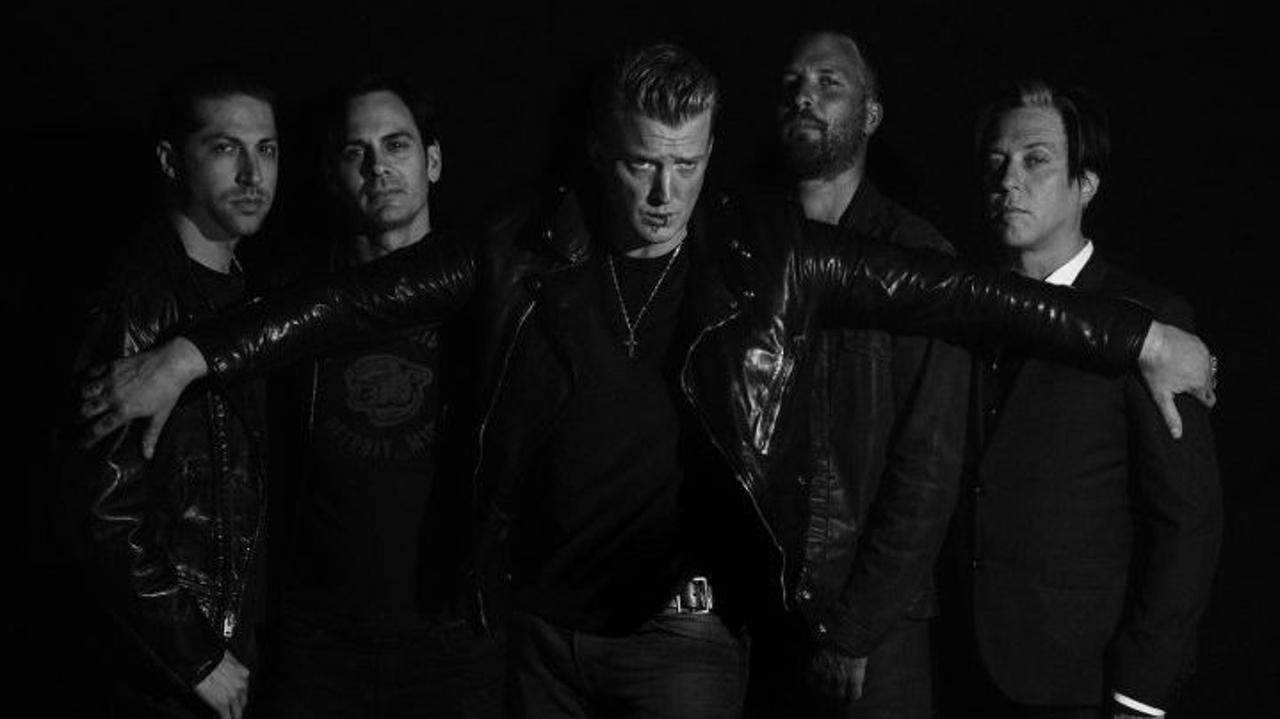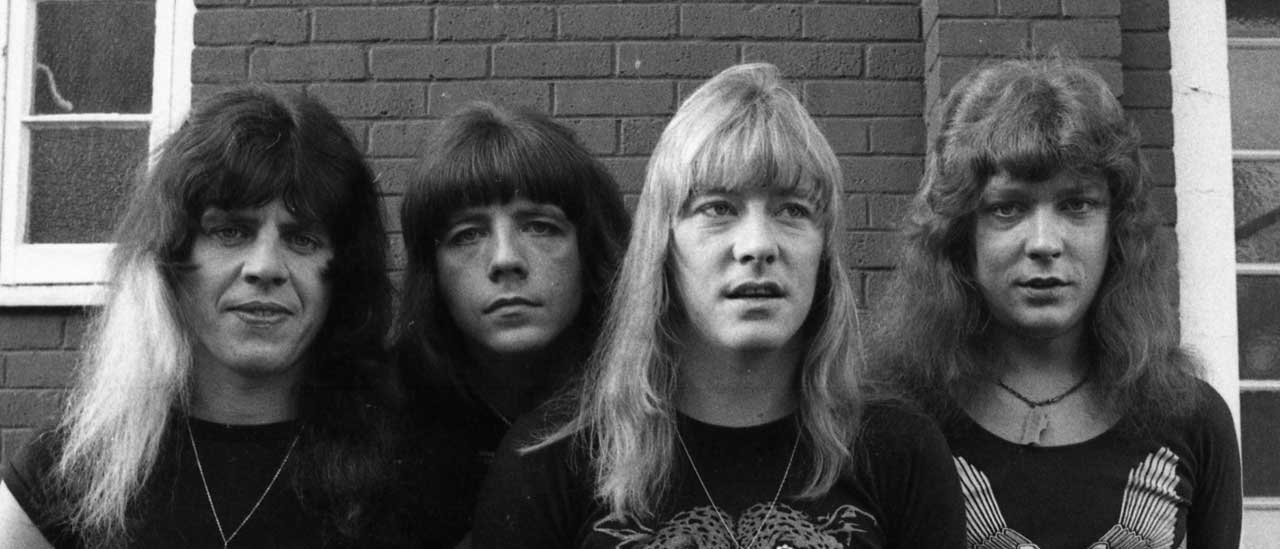Every Queens Of The Stone Age album ranked from worst to best
Post-Kyuss, Josh Homme embarked on a mission to create rock music “heavy enough for the boys and sweet enough for the girls”: here are QOTSA's eight albums in order of greatness

From upstart desert rats to globe-straddling alpha dons, for over two decades Queens Of The Stone Age’s Teutonic grooves and arsenal of riffs have set the gold standard for decadent, dangerous premier league rock. Led by Josh 'The Ginger Elvis' Homme and featuring a semi-recurring cast of many, they rose from the dustbowls of a cult stoner rock scene into the full-blown glare of the musical mainstream, garnering a clutch of Grammy Awards nominations, flirting with celebrity status, and kicking up a fair bit of controversy along the way.
Although QOTSA have proved to be a chameleonic beast, throughout it all their dedication to musical exploration and doing exactly what they want, how they want, has remained unwavering. When you’re as creatively prolific as Josh Homme has been however, the good stuff can sometimes be elusive. Sorting the 'meh' from the majestic, we rank their studio albums from worst to best…

8. Villains (2017)
You can trust Louder
Perhaps in his long-stated desire to make funky robot trance tunes Josh Homme was always destined to land somewhere like here, but this cartoonish, self-satisfied, wink of an album might have been better off released as a side project or as a bona fide solo effort. Yes, the band progressively feels like a solo vehicle in all but name anyway, but these throwaway songs simply aren’t up to the high standards QOTSA have established. That there’s only nine of them and the album has a run time of 48 minutes tells its own tale.
Notable for Mark Ronson overseeing production and a more accessible, retro-disco boogie timbre, there’s so little of the spark that makes the best Queens records such hard rock essentials. To its credit, Villains might succeed as an exercise in growing up gracefully, but for a group once so tantalisingly combustible, it’s hard to square that circle.
7. Lullabies To Paralyze (2005)
A record that sadly feels like a collective struggling to conjure the magic for the first time. Coming after Songs For The Deaf, Lullabies… admittedly had a tough act to follow, but it falls way short by unavoidable comparison. To witness a band who once felt so vicious, so edgy, and so special, suddenly appear entirely mortal felt extra stark.
Only Homme and Mark Lanegan return from the SFTD recording line-up, with bass berserker Nick Oliveri unceremoniously dumped (check out the delicious barb of Everybody Knows That You’re Insane) and Dave Grohl back at Foos HQ, and the indefinable alchemy that made those disparate parts combine so well seems MIA. By others’ standards, it’s an accomplished rock record - Little Sister and Burn The Witch are solid jams - but for QOTSA, it’s a so-so collection at best.
6. Era Vulgaris (2007)
On Era Vulgaris Queens threaten to recapture the sounds and soul of their turn of the century classics. They just don’t get there enough. The pulsing Sick, Sick, Sick, for instance, or the sleazeball lounge grooves of Make It Wit Chu, find Homme going back to the well with great success, but elsewhere there's much perspiration but little inspiration.
There’s too much fat, too many frills, and not enough of the uncompromising maverick spirit and mischief that made the band’s name. It’s still a lesson in powerhouse performance and musicianship, but it leaves you wondering what happened to the gang who felt primed to take over the world just a few short years before.
5. In Times New Roman… (2023)
Retreating from the Mark Ronson-produced reinvention heard on Villains six years prior, In Times New Roman… is a cathartic exercise in back-to-basics QOTSA. There aren’t any famous faces here. Josh Homme oversees production himself. And by revisiting the familiar territory of sun-kissed desert blues, the Queens head honcho works through his demons from a place of strength and safety.
Meaty guitars and airtight rhythms are back on the menu, alongside eastern strings, syrupy melodies, and fever dream segments. There’s the sharp loss of close friends (including chef Anthony Bourdain, actor Rio Hackford, Mark Lanegan, and Taylor Hawkins) in the ether. Homme’s recent cancer treatment and the messy fallout from his divorce too. He's had an unquestionably testing couple of years, all told.
The resulting record is more akin to electro-shock treatment than healthy therapeutic experience though. The unsubtle alpha-barbs on the otherwise brilliant riff storm of Paper Machete sit a little uncomfortably. The endless stream of puns in lyrics and titles eventually grow weary too, while one or two songs contribute to a mid-record sag. It’s a mostly roaring return nonetheless, but not one without its issues.
4. …Like Clockwork (2013)
…Like Clockwork is the kind of album that often gets labelled a ‘return to form’, but in truth, Queens have rarely ventured into this kind of broody, introspective territory, spurred by a series of professional setbacks, and a near-death experience for Josh Homme. Guest turns from Trent Reznor and Elton John might suggest something altogether more Hollywood, but these songs are more personal and vulnerable than Homme ever dared show previously.
Given the solemnity and gravitas of the title track, I Appear Missing and Fairweather Friends (a Mark Lanegan co-write), ...Like Clockwork might not be the record that you’d play to impress upon someone what QOTSA do best, but it's the weightiest and most 'grown up' record in their catalogue.
3. Queens Of The Stone Age (1998)
Raw and rough-hewn as it is by comparison with the rest of the band’s catalogue, there’s a roguish charm about this debut that pushes it towards the top end of the collective ranking. Sure, Queens would write better songs. They’d be more of a band on subsequent outings, and they’d certainly enjoy more success for their efforts. But at the core of this self-titled set there’s a purity of purpose that feels muted on later releases.
Feeling his way out of the implosion of Kyuss and stepping into the spotlight, Josh Homme stamps his mark on every nuance, playing everything but drums. There’s a dusty vintage to proceedings, right down to its throwback pinup artwork, and tracks such as If Only, Regular John, Mexicola and You Would Know forge templates that the band would adopt, rip up, and (at least try to) return to for years to come. A bold, brilliant debut.
2. Songs For The Deaf (2002)
Distilling the spirit of abandon that characterised their breakout success with Rated R into something still swaggering but sexier and sleeker, Songs For The Deaf is a towering statement that rightly made Queens superstars. That alluring devilment is still correct and present, but a firmer grasp of musical cohesion takes centre stage, with a loose threaded concept evoking a dark trip through the desert rubber-stamping the band’s bold ambition.
On-loan Foo Fighters boss Dave Grohl batters the drums here, while Mark Lanegan slithers in an out with that insouciant cool that only he could muster. Josh Homme, meanwhile, wrestles some of the band’s reckless frenzy into slightly more muzzled shapes, flexing into fresh artistic realms. Truthfully, there’s a rolling paper’s distance between this album and its predecessor for top ranking: this one boasts the big hits – No One Knows, Go With The Flow – but gets edged out of pole position due to the first hints of bloat that would blight later records.
1. Rated R (2000)
Rated R is the lightning-in-a-bottle moment where it felt like Queens Of The Stone Age might become the most important band in the world. Their second album is the sound of the sparks first ignited on their self-titled debut exploding into flames. And on tracks like Feel Good Hit Of The Summer, Leg Of Lamb, The Lost Art Of Keeping A Secret and Tension Head, Queens simply scorched.
With the addition of trousers-allergic bass beast, and fellow Kyuss alumni, Nick Oliveri, Josh Homme's band were now a fully formed outlaw gang. And here they produced an authentic soundtrack to the kind of wild Saturday nights that creak and blur into hazy Sunday mornings. You can argue that QOTSA scaled loftier artistic heights later, but this is the band at their all-round strutting, fighting, snorting, screwing, and no-fucks-given best. Two decades and change later, Rated R can still make you feel like you could use a hot bath and a good night’s sleep.
The latest news, features and interviews direct to your inbox, from the global home of alternative music.
Formerly the Senior Editor of Rock Sound magazine and Senior Associate Editor at Kerrang!, Northern Ireland-born David McLaughlin is an award-winning writer and journalist with almost two decades of print and digital experience across regional and national media.
